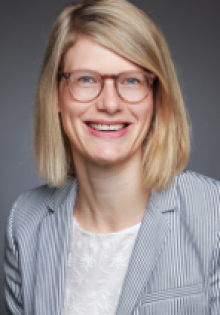The research association for the scientific monitoring of the BMBF Start-up Opportunities Programme has begun its work. The aim is to ensure that the schools involved in the programme and their management and support system benefit comprehensively from scientific expertise. Funded by the federal and state governments to the tune of 20 billion euros over ten years and launched on 1 August, the Startchancen programme aims to use a pioneering approach to decouple educational success from social background and ensure greater equality of opportunity. To this end, it systematically supports around 4,000 schools in socially challenging locations. Prof Dr Lena Wessel from the Institute of Mathematics at Paderborn University is a project partner and responsible for the area of training preparation in vocational school contexts.
‘It is absolutely right and quite visionary that the Startchancen programme aims to halve the proportion of children and young people who do not achieve the minimum standards in basic skills. The programme is unique in its focus because it addresses schools as a whole. It is therefore about the further development of schools and teaching, but also very much about the interaction with all stakeholders in the management and support system and the social environment,’ says Prof. Dr Kai Maaz from the DIPF | Leibniz Institute for Research and Information in Education, overall coordinator of the research network that has now been launched.
Maaz emphasises: ‘With the scientific support, we want to provide the best possible support for this networked approach, which builds on existing structures and addresses and integrates all relevant stakeholders. The aim is to contribute our knowledge at all levels so that innovative and productive forms of collaboration between practice, administration and research emerge. However, it will take time, extensive dialogue and a lot of work to ensure that all wheels mesh effectively.’ Wessel adds: ‘This will be a challenging task and at the same time represents an enormous opportunity to put scientific findings into practice and improve maths teaching in the long term, including with the involvement of young people and teachers at vocational schools. ’
Orientation of the research network
The network for scientific support and research for the Startchancen programme is primarily aimed at the support systems of schools in socially challenging situations. This includes, for example, the school authorities, local authorities, school inspectorates, the administration in the ministries and the state institutes. The network will contribute its evidence-based expertise, utilising and incorporating the needs, knowledge and experience of all those involved. The aim is cooperation on an equal footing and mutual learning from one another.
A central component of the work will be to develop binding and constructive cooperation formats together with the stakeholders in the management and support system and to build up new management knowledge. The aim is to create a governance structure that jointly and efficiently activates and interlinks all resources. Another focus will be on concepts and materials for school and lesson development and for working in networks. These will be compiled in a purpose-orientated manner, dovetailed with existing approaches and newly developed or further developed on the basis of research. In addition, the network will provide advice and further training to educational specialists and multipliers who are active in interdisciplinary networks, for example. The materials and further training will relate to specialist fields such as language education and mathematics, to interdisciplinary topics such as problem-solving and teamwork, as well as to socio-spatial and multi-professional organisational development. All concepts and structures are intended to be sustainable and benefit all schools in the long term.
Structure of the research network
The network comprises a total of 20 scientific institutes and universities with a wide range of specialised backgrounds. An extended steering committee is made up of researchers from the DIPF, the Friedrich Alexander University Erlangen-Nuremberg, the IPN - Leibniz Institute for Science and Mathematics Education, the Mercator Institute for Language Development and German as a Second Language, the University of Duisburg-Essen, the University of Mannheim and the University of Potsdam. The DIPF, as the centre of overall coordination, is also responsible for developing digital solutions for the collaborative work and communicating the results. Dr Martina Diedrich, previously Director of the Institute for Educational Monitoring and Quality Development (IfBQ) in Hamburg, has also joined the coordination team at the DIPF. The highly qualified system developer, who is very experienced in negotiation processes between the federal states and the federal government, will significantly enrich the design of the network and head the planned Governance Centre. Like the Startchancen programme, the network will run for ten years and is funded by the Federal Ministry of Education and Research with around 100 million euros.
The work of the network will be organised in close cooperation with the stakeholders in the schools and support systems in five competence centres, two transfer and transformation hubs and a governance centre. The governance centre will focus on innovative management approaches and cooperation formats. The competence centres will develop materials and qualifications, among other things, while the transfer and transformation hubs will initiate and support exchange and coordination processes. The network will also continuously coordinate with the scientific committee responsible for evaluating the Startchancen programme and its results. The aim is to tap into further potential in order to optimise the project work.
Wessel heads one of the ‘Didactics of Secondary Mathematics’ working groups at Paderborn University and, together with her team, researches topics relating to the teaching of mathematics at lower and upper secondary levels at general schools and vocational colleges. Her research focuses in particular on the principles of understanding-orientation and language education as well as teacher training and further training. She is also a network partner in the German Centre for Teacher Education in Mathematics.
This text was translated automatically.


